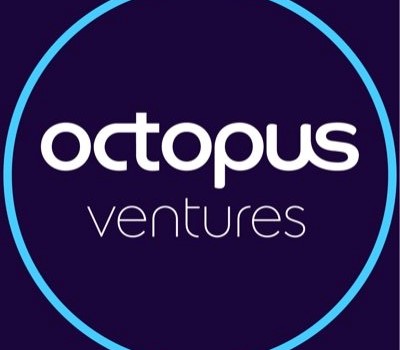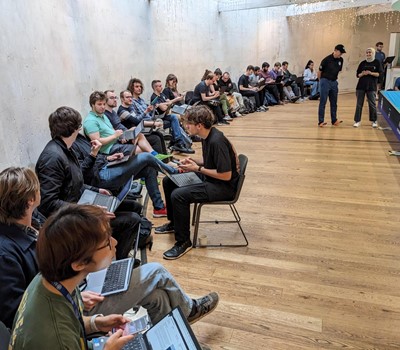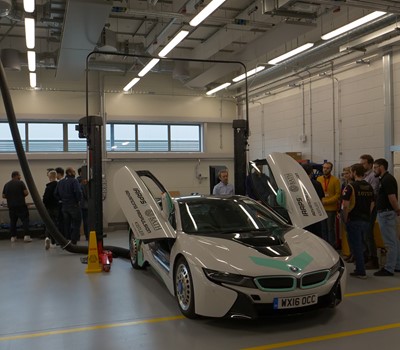WMG is a hub of collaboration between academia and industry, driving innovation in applied science, technology and engineering. This provided an excellent insight into the potential that academic-industrial collaboration has within the automotive sector. During this visit to WMG students were fortunate enough to witness first-hand the cutting-edge research and world leading facilities through a tour of the Energy Innovation Centre (EIC) – a national facility for all aspects of battery research, from materials and electrochemistry through to application integration and recycling.
This workshop included a visit to both Aspire Engineering and MCT Reman, and a tour of both facilities. The workshop was focussed on sustainable engineering solutions, such as the design and manufacturing for recycle-ability.
AB Dynamics is one of the world’s leading specialists in automotive test systems across a wide range of applications, from validation and durability to the development of advanced technologies for active safety and autonomous driving. As part of the MRes year our students in Cohort 1 had the opportunity to visit, to partake in a demonstration of their in-house Advanced Vehicle Driving Simulator (aVDS) for a closer look at safety and autonomous driving and virtually drive a range of vehicles.
Wendy Sadler from Science Made Simple delivered a public engagement workshop for the CDTS based at University of Bath, ART-AI, CSCT and SAMBa.
The first section of this workshop included an introduction to public engagement 'What do we know? Why do we do it? Who should we engage with and what are the barriers?' and the second section was focussed on what the message is, and thinking about a useful structure for communicating research. Tools for engagement and minimising jargon and some tips on effective delivery.
AAPS CDT Students attended a series of summer masterclasses on the theme Thermal Modelling Techniques. In this session they gained an overview of engine and turbocharger modelling techniques and experience of different simulation software.
AAPS CDT Students attended a series of summer masterclasses on the theme Thermal Modelling Techniques, this session gave an in depth overview of electric motor modelling and architectures.
AAPS CDT Students attended a series of summer masterclasses on the theme Thermal Modelling Techniques, this session gave an overview of three different modelling domains within SaberRD: Electrical, Mechanical and Thermal. Students constructed a basic model for each of the three domains and simulated various typical scenarios, allowing them to solidify our knowledge whilst gaining experience working in SaberRD.
This workshop, hosted by WECA (West of England Combined Authority), provided an opportunity to work with a local authority and to discuss solutions and improvements to the surrounding mobility and transportation infrastructure while utilising the CDTs multidisciplinary pool of knowledge. This session gave an oversight to WECA's Future Transport Zone (FTZ).
On the 30th of July 2021, Cohort 1 students joined the Sustainable Electric Propulsion (SEP) Centre for Doctoral Training (CDT) of Newcastle University for a debating competition on Responsible Research and Innovation (RRI). The intention of this was to help students with writing their RRI statements for their PhDs.
For this day, participants were split into 4 teams. In turns, two teams were given a subject. One team would pitch in favour of the idea, while the second one would persuade the audience into disagreeing with the given statement. The remaining 2 teams would act as the audience and vote for the most convincing argument.
The topics given were in line with the main themes of both CDTs : green propulsion, electrification, and clean energy. By doing this, contributors were all intrinsically challenged by the struggle of defending, or pulling to pieces, their core beliefs and the building blocks of their work environment.
This summer masterclass gave an an overview of sustainability and the opportunity to learn about the theory of LCA (attributional, consequential, use in existing and emerging technology/materials) and look into different case studies.
This masterclass was on the theme Low Carbon Fuels, where students learnt about the chemistry behind conventional fuels and what they actually are, what each family of components do and used this as a platform to overview the main routes to future renewable transport fuels. This masterclass also gave an introduction to Hydrogen.
This masterclass was on the theme Gas Purification where students learnt about different technologies for air cleaning, reduction of emissions and treatment of exhaust gas and gained an understanding in the differences between new and traditional technologies in terms of emissions.
Science Made Simple delivered a two day bespoke training package for AAPS Students as part of a series of roadshows being created and delivered by AAPS students.
Day one of the training was designed to familiarise volunteers with the project, develop workable ideas and develop presentation skills and materials appropriate, including:
Day two of the training was an opportunity for students to present their prototype materials and develop further presentation skills including:
Josef Zehetner from AVL ran a two day summer masterclass providing an overview of model based development.
Day 1 provided an introduction to model based development, with Day 2 continuing on the topics and taking a deep dive into IODP tools and methods.
A team of Technical Specialists from Jaguar Land Rover delivered a 2-day masterclass on Vehicle Efficiency, on 12th and 13th January 2023. The masterclass comprised both practical and theoretical elements. Participants learnt from practitioners how vehicles are instrumented and tested to measure accurate road load that is critical for estimating how much energy a vehicle requires & consumes, which in turn underpins modelling and laboratory experiments aimed at estimating key vehicle performances and legislative metrics.
Day 1 was undertaken at Thruxton Racetrack and focussed on the practical techniques of measuring road load. Here attendees experienced how to conduct of a coast-down test using one of JLRs instrumented electric vehicles. They experienced the techniques used to collect this data from which the vehicle rolling resistance and aerodynamic drag is estimated.
Day 2 focussed on the interpretation of coast-down & energy consumption test data, collected day before, and its use in the estimation of vehicle range and energy consumption. The session also covered the breadth of driving conditions and vehicle usage patterns and how these affect the predicted vehicle range.
As part of providing the training in the MRes year, Rosie Sullivan and Ryan Williams from Marine & Technology Babcock International joined the AAPS students to share thoughts to understand the challenges for future Mobility from a commercial organisation point of view, based on the Babcock Technical Centre site which in the vicinity of IAAPS site (part of the University of Bath) at the Science Park.
Babcocks’s challenge is that their technology centre is a growing campus and there is widespread car use and dependence. There is a limited availability or use of public transport or MaaS (Mobility as a Service) and a large number of people live a distance form their offices. So, the current operating model of business is dependent on car, centralised offices, outer-urban location; strategic road links; large recruitment and catchment area; and much more.
The majority of people travel from their home to the offices by car which is similar to the university challenge our MRes students were looking at for the Innovation unit. However, pandemic driven a sudden growth of working from home has opened the opportunity to reconsider the travel requirements of the staff at Babcock. Many options are under consideration, the greatest of which is collaboration between the many players in developing a more integrated mobility solution.
Nested within a longer-term UK operations sustainable transport strategy (which is in development); all being driven by a Plan Zero 40, for carbon neutrality by 2040. Currently at the stage of implementing basics and adjusting programme to post-pandemic context, as well as formulating medium / long term plans.
The students found this discussion insightful and created many options in the development of their ‘wicked’ problem solutions for transport for staff and students in the University.
As part of providing the training for the MRes students, Dave Skipp, Director, Autonomous Vehicle & Mobility Strategy at Ford Motor Company joined the students to share thoughts related to an understanding of the challenges for future Mobility.
In the session the students explored the difficulties with the much needed transformations to reduce the impact of carbon emissions into the atmosphere. Based on Dave's experience he shared a personal view of the way people and goods need to move, or not, in the future and the opportunities that businesses could explore. The automotive industry in general is facing these changes creating new business models with less reliance on high volume production to diversification into delivery services and MaaS (Mobility as a Service). Further, there is the diversification into new propulsion systems with the multitude of new technologies, not just with the vehicle but the connections broadly described as V2X.
The session included a interesting period of time exploring and answering the many questions the students had related to the project they had reducing the carbon impact of students and staff travelling between their place of residence and the University of Bath. Dave shared his personal insights during this engaging dialogue which both stimulated the students to think more broadly around the subject and in doing so initiated some additional lateral thoughts to generate some useful new perspectives.
It is important for the students to understand in broad terms the challenges in propulsion and mobility in order to establish new areas of research in support of industry.
Fran Long, Head of Training and Talent Development at the Faraday Institution delivered a session for AAPS students on how to build their researcher professional identities and how to harness the power of LinkedIn to boost career success. Attendees were able to learn about the benefits of actively seeking professional development and training opportunities in the areas of technical knowledge and skills, research and business management, personal effectiveness as well as how to maximise impact and influence in line with best practice guidance from Vitae.
The themes explored during this session included:
Fran Long leads work on researcher professional development and a bespoke PhD training programme in the quest to create a dynamic and diverse pool of talent for the fields of battery technology and energy storage. An innovative educator who has conducted research into raising STEM career aspirations, Fran is committed to boosting professional career development in the STEM sector through developing and leading programmes for early career researchers, PhDs, undergraduate students, young people (through STEM outreach) as well as a host of equality, diversity and inclusion initiatives that widen participation and foster inclusivity.
An exclusive one-day masterclass, delivered by technical experts from Kistler for AAPS students, IAAPS researchers and technical staff seeking to advance their understanding of sensor technologies, applications, and industry best practices to ensure measurement accuracy.
The morning session included a series of classroom-based talks on the challenges of high-speed data acquisition on the test bed and in-vehicle, combustion sensor technologies and signal processing. Led by Kistler's instructors, participants learnt about the design and functionality of sensors, gaining insight into their diverse applications. The session emphasized industry best practices, equipping participants with the essential knowledge and tools to excel in the field of high-speed data acquisition.
The afternoon session had a practical focus, consisting of a hands-on learning about sensor installation, inspection, and maintenance. Participants had the opportunity to configure and take in-vehicle combustion measurements using the IAAPS BMW i8 test vehicle to investigate knock, phasing, and balancing. This practical session provided a fantastic opportunity to understand the processes and considerations for capturing real-time data and harness it for informed decision-making.
AAPS CDT students received an invitation from the ART-AI CDT, to the Amazon Web Services DeepRacer student competition they were hosting.
DeepRacer is racing of machine learning powered cars to get the fastest time. The cars are set up with a camera on them to scan the track, then uses reinforcement learning to make them go faster.
An exciting opportunity for AAPS students to join a workshop on venture capital and deep tech investments, run by Octopus Ventures, with SAMBa and ART-AI CDT students also attending.
Octopus Ventures are one of the largest and most active venture capital investors in Europe. They offered this workshop to engage with our students early in their careers, to start thinking about entrepreneurship and start-ups as viable career opportunities. Octopus have made a public pledge that by 2027 50% of all businesses which pitch to them will be led or co-led by a woman, and have resolved to apply similarly ambitious goals to other measures of diversity over the coming years.
The format for the workshop was
A workshop organised in conjunction with ART-AI and SAMBa CDTs to explore the importance of Responsible Research and Innovation and what it means to researchers. The session included collaboration and networking to discuss ethics and social issues around research. This discussion was supported by presentations and a panel made of experts in different disciplines.
ThinkWrite delivered a workshop on Conference Abstracts and Posters, the objectives of the session were for attendees to learn how to identify the readers and decision-makers that they need to consider when planning the abstract and poster for a conference, how to determine the key message of their abstract and poster, write the abstract quickly and concisely, recognise elements of design that can grab attention of attendees, create imaginative posters that communicates their research efficiently and prepare to present their work professionally at a conference.
As part of AAPS CDT students training programme, we run annual allyship and inclusion sessions. These sessions are run by an external company enei.org.uk and cover topics such as:
• Understanding the equality act and how it applies in the workpace
• Discrimination and Harassment in the Workplace - how to address and prevent these issues
• Inclusive Behaviour and Leadership - strategies for implementing within your team
• Active Allyship
These sessions offer valuable insights and practical tools for creating a more inclusive and supportive work and research environment.


29 November 2023

13 November 2023

28 April 2023

18 September 2023

23 February 2023

25 August 2022

06 June 2022

09 September 2021

16 September 2020

26 November 2019


21 December 2021
© Copyright 2024 AAPS CDT, Centre for Doctoral Training in Advanced Automotive Propulsion Systems at the University of Bath